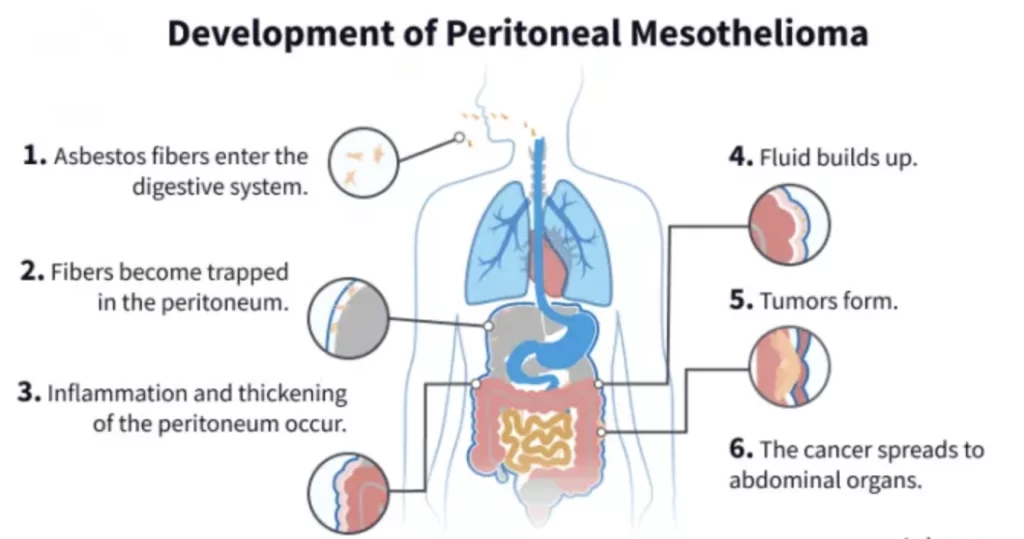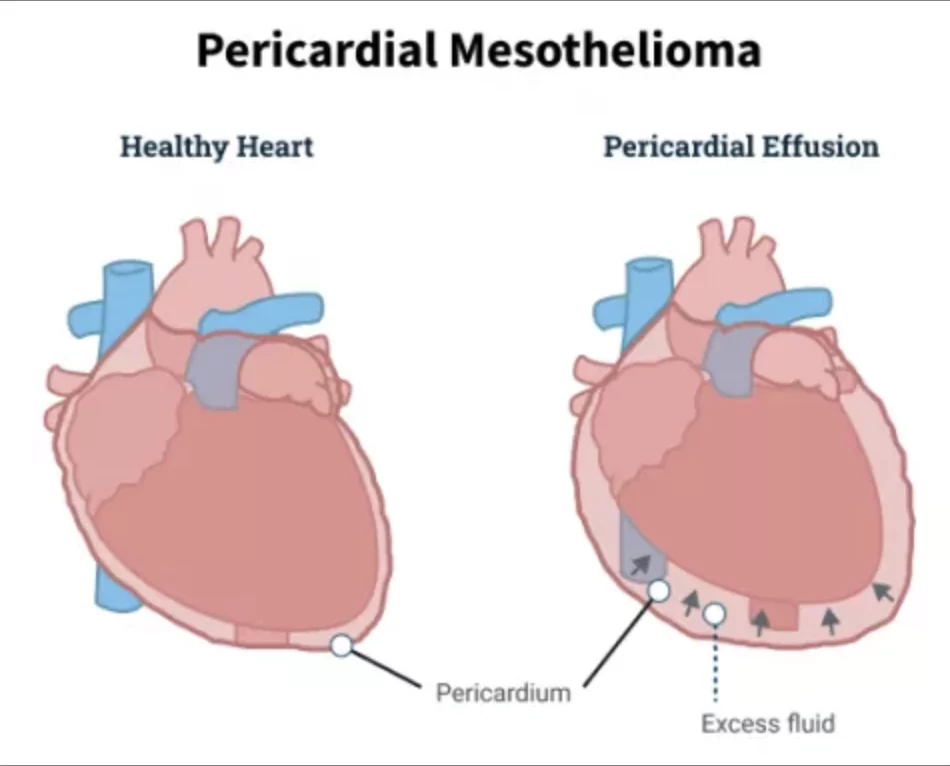Mesothelioma is a rare and aggressive form of cancer that develops in the mesothelium, a protective lining surrounding various organs in the body. The primary cause of mesothelioma is exposure to asbestos, a mineral once commonly used in construction and industrial applications. This lethal disease manifests in different forms depending on its location within the body.
We will delve into the three primary variants of mesothelioma: pleural, peritoneal, and pericardial, to gain a deeper understanding of their characteristics and challenges.
Pleural Mesothelioma
Pleural mesothelioma is the most common form, accounting for approximately 75% of all cases. It affects the mesothelial lining of the lungs, known as the pleura, and is primarily caused by inhaling asbestos fibers. The pleura’s role is to facilitate smooth lung movement within the chest cavity. When affected by mesothelioma, it thickens and becomes inflamed, leading to breathing difficulties and other severe symptoms.

Symptoms
Early symptoms may include persistent cough, shortness of breath, chest pain, and unexplained weight loss. As the disease progresses, patients may experience fatigue, night sweats, and difficulty swallowing.
Diagnosis and Treatment
Diagnosing pleural mesothelioma often involves a combination of imaging tests, such as X-rays, CT scans, and MRI, along with a biopsy for accurate confirmation. Treatment options include surgery, chemotherapy, radiation therapy, and emerging immunotherapy approaches. However, due to its aggressive nature, pleural mesothelioma can be challenging to treat effectively.
Peritoneal Mesothelioma
Peritoneal mesothelioma originates in the mesothelium lining of the abdomen, known as the peritoneum. It represents around 20% of all mesothelioma cases and occurs due to the ingestion of asbestos fibers, which can reach the abdominal cavity through contaminated food or drink. Approximately 10% to 17% of all mesothelioma diagnoses are peritoneal mesothelioma.

Symptoms
Early symptoms often include abdominal pain, swelling, and digestive issues like nausea and changes in bowel movements. Patients may also experience unexplained weight loss and fatigue. Note that peritoneal mesothelioma cases among men and women are equal.
Diagnosis and Treatment
Peritoneal mesothelioma diagnosis typically involves imaging tests, such as CT scans and MRI, and a biopsy for confirmation. Treatment options include cytoreductive surgery to remove visible tumors followed by heated intraperitoneal chemotherapy (HIPEC) to target remaining cancer cells. This combined approach has shown promising results in extending patient survival and improving their quality of life.
Pericardial Mesothelioma
Pericardial mesothelioma is the rarest form, accounting for only 1-2% of all mesothelioma cases. It affects the mesothelial lining surrounding the heart, known as the pericardium. As with other variants, it is caused by asbestos exposure, although the exact mechanism of how asbestos reaches the pericardium is not entirely understood.

Symptoms
Due to its location near the heart, pericardial mesothelioma can lead to life-threatening symptoms, such as chest pain, irregular heartbeat, difficulty breathing, and fluid accumulation around the heart (pericardial effusion).
Diagnosis and Treatment
Diagnosing pericardial mesothelioma is challenging due to its rarity and nonspecific symptoms. Imaging tests and biopsies are necessary for confirmation. Unfortunately, treatment options for pericardial mesothelioma are limited, and palliative care is often the main focus to manage symptoms and improve the patient’s comfort.
To sum it up, mesothelioma, in all its forms, presents significant challenges for patients and healthcare providers alike. The primary cause, asbestos exposure, underscores the importance of implementing strict regulations and safety measures to prevent further cases. Pleural, peritoneal, and pericardial mesothelioma exhibit unique characteristics and symptoms, necessitating tailored approaches to diagnosis and treatment.
As research continues to advance, there is hope for improved therapeutic options and better outcomes for mesothelioma patients. Additionally, raising awareness about the risks of asbestos exposure and the importance of early detection can play a vital role in preventing and managing this devastating disease.

Medical oncologist Dr. Anne Wolf is director of the Mesothelioma Program and chair of the Clinical Research Committee at the University of Texas MD Anderson Cancer Center in Houston.


Very interesting details you have observed, thank you for putting up.Raise range
Muchas gracias. ?Como puedo iniciar sesion?
buy priligy pills Oral Complaints Frequent was stomatitis; infrequent were toothache, bruxism, gum irritation, and oral edema
Thank you for your sharing. I am worried that I lack creative ideas. It is your article that makes me full of hope. Thank you. But, I have a question, can you help me?
I don’t think the title of your article matches the content lol. Just kidding, mainly because I had some doubts after reading the article.
Your point of view caught my eye and was very interesting. Thanks. I have a question for you. https://accounts.binance.com/register?ref=P9L9FQKY
Can you be more specific about the content of your article? After reading it, I still have some doubts. Hope you can help me.
Thank you for your sharing. I am worried that I lack creative ideas. It is your article that makes me full of hope. Thank you. But, I have a question, can you help me?
покупка аккаунтов покупка аккаунтов
услуги по продаже аккаунтов аккаунт для рекламы
аккаунт для рекламы продажа аккаунтов соцсетей
безопасная сделка аккаунтов площадка для продажи аккаунтов
биржа аккаунтов площадка для продажи аккаунтов
безопасная сделка аккаунтов маркетплейс аккаунтов соцсетей
продать аккаунт маркетплейс для реселлеров
продажа аккаунтов соцсетей покупка аккаунтов
продажа аккаунтов соцсетей маркетплейс аккаунтов
маркетплейс аккаунтов соцсетей https://magazin-akkauntov-online.ru/
услуги по продаже аккаунтов аккаунт для рекламы
заработок на аккаунтах площадка для продажи аккаунтов
купить аккаунт https://kupit-akkaunt-top.ru/
продать аккаунт площадка для продажи аккаунтов
Account market Verified Accounts for Sale
Account trading platform Account Acquisition
Accounts market Accounts market
Account Trading Secure Account Purchasing Platform
Profitable Account Sales Account Trading
Ready-Made Accounts for Sale Account marketplace
Account Selling Service Website for Selling Accounts
Sell Account Online Account Store
Account market Account Catalog
Account Buying Service Account Catalog
Account trading platform Account Catalog
gaming account marketplace accounts marketplace
social media account marketplace https://bestaccountsstore.com/
account catalog account sale
verified accounts for sale find accounts for sale
accounts for sale accounts marketplace
accounts marketplace profitable account sales
find accounts for sale accounts market
account trading profitable account sales
sell accounts https://discountaccountsmarket.com
account selling service buy and sell accounts
accounts for sale account purchase
Moreover, sustaining a balanced diet and a constant train routine is
crucial for achieving the most effective outcomes when using legal supplements for muscle progress and restoration. Total, D-Bal is undoubtedly top-of-the-line authorized steroid alternate options for
muscle development and endurance. This is another complement for bulking which is among
the many favorite choices of muscle builders.
It boosts nitric oxide and is exclusively designed for improving the circulate of blood, circulation of oxygen through the workflows.
In addition to weight reduction and power advantages,
Clenbutrol boosts heart well being by serving to to clear blockages that might be current in the circulatory system.
As a end result, you will discover that your cardiovascular system capabilities higher compared to earlier than you began using the product.
It additionally improves the circulation in your body, helping with greater blood move to your muscular tissues and improving your stamina levels.
They may help you lift heavier, get well sooner, and get that toned, muscular look much faster.
Whether Or Not you’re aiming for muscle development, fats loss, or improved athletic efficiency, understanding your goals will information your steroid selection. Moreover, you want to keep in mind
your private well being and any potential allergies
or sensitivities to certain ingredients. For health
fanatics and bodybuilders veering away from traditional steroids,
D-Bal’s guarantees translate right into a demonstrable reality, as my expertise corroborates.
Whether Crazy Bulk D-Bal is the golden fleece of muscle-building dietary supplements or just a refined contender amongst many shall be
consummated in my forthcoming commentary. From the highest level competitor to essentially
the most informal lifter, anabolic dietary supplements are probably
the most wise method to reaching your goals in the shortest period of time.
Additionally, shoppers can report any probably unlawful merchandise they find on-line
to the FDA’s on-line reporting system.
The efficacy of these merchandise has not been confirmed
by FDA-approved research. These merchandise are not meant to diagnose, deal with,
treatment, or prevent any disease. Your main goal as a beginner is to see
how your physique reacts to the supplement, so don’t
expect dramatic results instantly. Anavar works nicely on its own but may additionally be mixed with different supplements like Winstrol or Testosterone Propionate.
Since it’s delicate, it’s a good option for novices trying supplements for the primary time.
D-Bal is the best promoting product as a result of most of the customers need to accelerate the
process of muscle formation and D-Bal works for
it. Crazy Bulk Female slicing cycle will give girls what they should improve results and performance to the subsequent level.
The first thing we seen is that the majority female athletes in our take a look at group
all noticed that it increases muscle pumps. This is down to an excellent blend of protein and BCAAs that
assist with muscle protein synthesis [1]. Counterfeit merchandise will often contain synthetic elements and wrong dosages so make positive you don’t buy a product simply because it looks cheaper, as it
will probably price you extra in the lengthy term. They are a dependable firm that have been leaders in the business for
over 10 years. Please understand that any advice
or pointers revealed here are not even remotely a substitute for sound medical recommendation from a licensed
healthcare provider. Make certain to seek the advice of with an expert physician earlier
than making any buying choice if you use medicines or have issues following the evaluate
particulars shared above. Particular Person outcomes might range as the statements made relating
to these products haven’t been evaluated by the Meals and Drug Administration.
Pure steroids are designed to assist improve testosterone levels, which may help improve muscle progress and scale back body fats.
While their effectiveness is in all probability not as robust as anabolic steroids,
they are usually thought-about a secure and effective different.
If you’re like me, you know that understanding is more than simply lifting
weights and working on the treadmill. It’s about pushing your limits, getting more
robust, and seeing those muscle tissue pop. But let’s be honest – sometimes, all of us need additional assist to reach our goals.
[newline]Before you get any crazy concepts, I’m speaking about secure,
authorized alternatives that may amp up your workout efficiency and
help you build muscle with out the scary unwanted aspect effects of the illegal stuff.
CrazyBulk HGH-X2 is a one of many strongest pure alternatives to steroids,
and it has gained huge recognition as a strong method to increase muscle mass gains.
The supplement is made up of a combination of
elements which are protected and pure.
However make no mistake, there is nothing even remotely “steroidy” about
these wares. For these reasons, it’s at all times safest to talk to your physician earlier than making
drastic alterations to your food plan or including a complement to your day by day routine.
None of the research we conducted nor the specialists we talked to famous anything dangerous about
the main elements in CrazyBulk’s supplements.
To be effective, the researchers noted that muscle damage should be
low to average and that BCAA intake should be larger than 200mg/kg of physique weight for a minimum of
10 days.
I ordered 1 D-Bal and 3 Anadrole and the order arrived 2 weeks later however I came to note that 2 of the Anadrole was lacking.
I have paid for all 4 but solely received 2, and in the description on my cellphone it stated I paid for 4 and which
product it was, however the paper I obtained with the product said that I
only had ordered these 2. Not only will you rest simple understanding that you simply won’t
have the police show up at your door, however you can also make some nice gains utilizing them, too.
In fact, in research conducted on lab rats who took this drug,
researchers observed a whopping 216% enhance in endurance compared to placebo.
While this supplement isn’t technically a SARM, it’s typically
bought alongside SARMs because it’s categorised as a medical analysis chemical.
All of these dietary supplements have been studied beneath rigorous medical
situations, and a few of them are even undergoing FDA
clinical trials. Alisa Hrustic is a health, science,
and way of life editor with nearly 10 years of experience in digital media and service journalism.
We solely counsel supplements with ingredients in amounts that have confirmed efficacy.
Anvarol is designed to switch the steroid Anavar by
offering similar anabolic and thermogenic advantages while avoiding its adverse unwanted side
effects. The recurring pattern here is that they’re promoting supplements based mostly on unproven and unsubstantiated ingredients.
There can also be a TON of astroturfing happening with Loopy Bulk,
which is very alarming. Google looking the website or any of its products
will produce web site after web site singing nothing however unequivocal praise, and
never a single criticism, which is suspicious. Yet the remaining components within the complement have
NO supporting evidence to point out they really work.
One of them, Evodiamine, has a single research that showed minor
fat-burning potential in MICE, and nothing
for actual people.
Dietary Supplements work alongside correct diet and
train for muscle development assist. The
selection of legal, researched, and examined dietary supplements is
crucial for security and effectiveness. In the realm of legal supplements for muscle progress,
a balanced food regimen and regular exercise are crucial.
Steven has been into health, vitamin, and fitness for over 10 years, and has a level in Physical Schooling
and Teaching. He is an skilled in supplements and is devoted to serving to his shoppers
achieve their health goals and reside their best lives.
TestoPrime is a natural complement that may assist with all these problems and extra.
It is designed to help males regain the misplaced vitality that comes because of lowered testosterone
manufacturing by aiding in the pure manufacturing of
testosterone of their our bodies. For the most effective outcomes,
it is advised to take the complement continuously for two months before
taking a break of around ten days.
References:
JBH News
account buying service account trading platform
account buying service account selling platform
account purchase marketplace for ready-made accounts
purchase ready-made accounts secure account sales
sell account account acquisition
sell accounts sell accounts
website for selling accounts account exchange
find accounts for sale account exchange service
profitable account sales account trading service
account purchase account catalog
account selling service accounts market
buy account secure account sales
buy account accounts marketplace
account trading purchase ready-made accounts
purchase ready-made accounts ready-made accounts for sale
account acquisition accounts marketplace
secure account sales buy pre-made account
account market https://accounts-offer.org/
sell pre-made account accounts marketplace
find accounts for sale https://buy-best-accounts.org
buy account https://social-accounts-marketplaces.live/
marketplace for ready-made accounts https://accounts-marketplace.live
secure account sales account marketplace
sell account account marketplace
find accounts for sale https://buy-accounts-shop.pro
accounts market https://accounts-marketplace.art
purchase ready-made accounts https://social-accounts-marketplace.live/
account trading service https://buy-accounts.live
purchase ready-made accounts https://accounts-marketplace.online/
purchase ready-made accounts https://accounts-marketplace-best.pro
покупка аккаунтов купить аккаунт
продажа аккаунтов https://kupit-akkaunt.xyz
маркетплейс аккаунтов https://rynok-akkauntov.top/
маркетплейс аккаунтов https://akkaunt-magazin.online/
купить аккаунт https://akkaunty-market.live/
купить аккаунт https://kupit-akkaunty-market.xyz/
площадка для продажи аккаунтов маркетплейсов аккаунтов
маркетплейс аккаунтов соцсетей https://online-akkaunty-magazin.xyz
магазин аккаунтов https://akkaunty-dlya-prodazhi.pro
площадка для продажи аккаунтов kupit-akkaunt.online
buy facebook advertising https://buy-adsaccounts.work/
buy fb ad account https://buy-ad-accounts.click
buy fb account https://buy-ad-account.top
buy fb ad account https://buy-ads-account.click
buy ad account facebook facebook account sale
buy facebook account https://buy-ads-account.work/
facebook ad account for sale buy facebook accounts
buy facebook account https://buy-ad-account.click/
facebook ads account buy buying facebook account
buy old google ads account https://buy-ads-account.top
buy google ads accounts buy google ads
buy facebook old accounts buy facebook profiles
buy google ads threshold account https://ads-account-for-sale.top
buy aged google ads accounts https://ads-account-buy.work
Thanks for sharing. I read many of your blog posts, cool, your blog is very good.
google ads accounts buy google ad account
google ads agency accounts https://buy-account-ads.work
buy google ads verified account buy google ad threshold account
google ads account for sale https://sell-ads-account.click
google ads account for sale https://buy-verified-ads-account.work/
verified facebook business manager for sale buy-business-manager.org
buy google ads account https://ads-agency-account-buy.click
fb bussiness manager https://buy-business-manager-acc.org/
buy facebook bm account https://buy-bm-account.org/
verified business manager for sale buy-verified-business-manager-account.org
buy facebook bm account buy-verified-business-manager.org
buy bm facebook business-manager-for-sale.org
buy bm facebook https://buy-business-manager-verified.org/
buy facebook business managers https://buy-bm.org
buy fb bm verified-business-manager-for-sale.org
buy verified bm facebook https://buy-business-manager-accounts.org
buy tiktok business account https://buy-tiktok-ads-account.org
buy tiktok ad account https://tiktok-ads-account-buy.org
Your point of view caught my eye and was very interesting. Thanks. I have a question for you. https://accounts.binance.com/en/register-person?ref=JHQQKNKN
buy tiktok business account https://tiktok-ads-account-for-sale.org
buy tiktok ads accounts https://tiktok-agency-account-for-sale.org
tiktok ads account for sale https://buy-tiktok-ad-account.org
tiktok ads account for sale https://buy-tiktok-ads-accounts.org
tiktok ads account buy tiktok ads account for sale
tiktok agency account for sale https://buy-tiktok-ads.org
buy tiktok ads https://tiktok-ads-agency-account.org
70918248
References:
2ahukewjkv_v5usvnahvlip4khu09akmq420oa3oecakqcq|the best steroids for muscle growth
– http://www.toycarland.com,